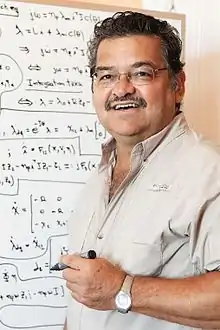Romeo Ortega | |
|---|---|
 | |
| Born | |
| Citizenship | Mexican |
| Alma mater | National University of Mexico |
| Known for |
|
| Scientific career | |
| Fields | Control systems |
| Institutions | Supélec, ITMO University, ITAM |
| Doctoral advisor | Ioan Doré Landau |
Romeo Ortega, born in Mexico, is a Mexican-French control scientist and distinguished professor. He is head of the Adaptive and Nonlinear Control Systems Lab in St. Petersburg, Russia and full-professor at the Mexico Autonomous Institute of Technology (ITAM) in Mexico City.
Education
| Year | Degree | University |
|---|---|---|
| 1974 | BSc in Electrical and Mechanical Engineering | National University of Mexico, Mexico |
| 1978 | Master of Engineering | Polytechnical Institute of Leningrad (now Saint Petersburg), USSR |
| 1984 | Docteur D`Etat | Polytechnical Institute of Grenoble, France |
Career
| Year | Position | University |
|---|---|---|
| 1984-1989 | Lecture | Polytechnical Institute of Grenoble, France[1] |
| 1987-1988 | Visiting Professor | University of Illinois, USA |
| 1991-1992 | Visiting Professor | McGill University, Canada |
| 1992–present | CNRS Research Director | Laboratoire de Signaux et Systemes (SUPELEC), France |
| 2013–present | Head of laboratory | Adaptive and nonlinear control systems lab of ITMO University |
| 2020-present | Full professor | Mexico Autonomous Institute of Technology (ITAM) |
Membership
In 1990-1991 Romeo Ortega was a fellow of the Japan Society for Promotion of Science. Since June 1992 Romeo Ortega is a member of the French National Researcher Council CNRS). Since 1999 he is a Fellow Member of the IEEE. From January 2020, Romeo Ortega is member of the Mexico National Researchers System (SNI) level 3.
Publications
Professor Ortega authored and co-authored more than 550 papers with more than 10000 citations. His h-index is 66 (July 2015).[2]
See also
References
This article is issued from Wikipedia. The text is licensed under Creative Commons - Attribution - Sharealike. Additional terms may apply for the media files.